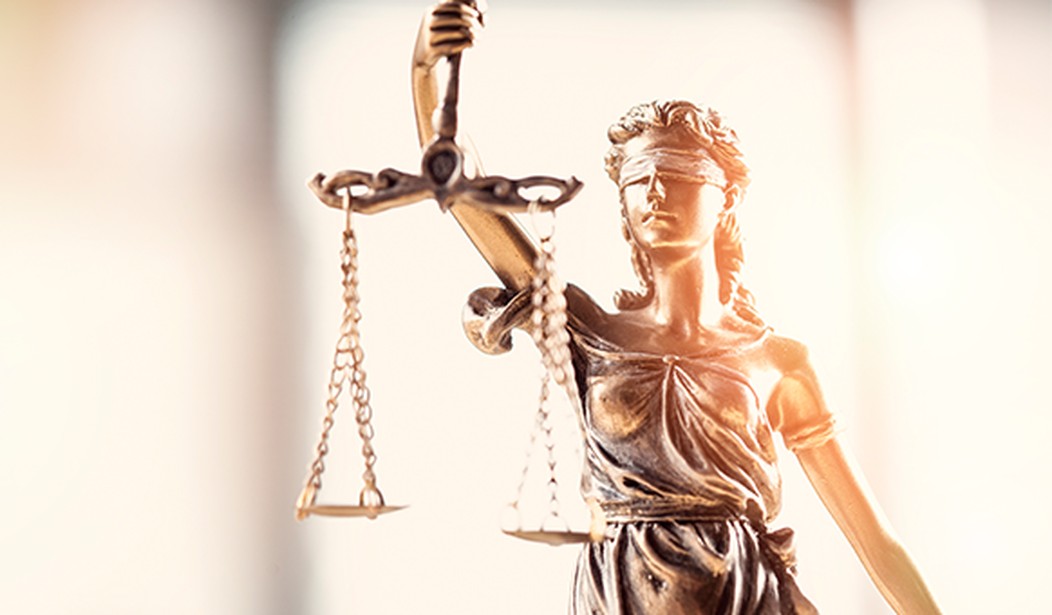The U.S. Constitution is a political masterpiece. The ideas of limited government enshrined therein, with its system of checks and balances, its federalist structure, and its Bill of Rights, is responsible for more freedom and prosperity, not just in America but worldwide, than any other document other than the Bible.
The Constitution only had two glaring flaws. The first was the reluctant tolerance of slavery, which was eventually corrected by the 13th Amendment (and a civil war). The second was a lack of restraint on the powers of the judiciary. There are mechanisms for the legislative and executive branches to check each other, but nothing with which to check the judiciary (other than impeachment, the mere suggestion of which threw John Roberts into a full blown hissy fit last month).
The Founding Fathers never established any checks on the judiciary because the judiciary was never entrusted with the power to declare legislation or executive action unconstitutional. This "right" of judicial review was established out of thin air by the Supreme Court itself in 1803 with Marbury v. Madison. In this case, the court simply declared, on its own and with no authority other than its own declaration, that it reserved the right to void legislation it deemed unconstitutional.
Since then, both the legislative and executive branches (with the exception of Andrew Jackson and Joe Biden) have deferred to the final judgment of SCOTUS in such cases. But they have done so out of tradition and precedent, not out of constitutional necessity. The filibuster is tolerated for the same reasons.
I'm not making the argument that SCOTUS should not have the power of judicial review. If the powers for such a review were amended to the Constitution, it would legitimize a pragmatic and sober addition to our system of checks and balances. But those checks and balances must go both ways in order for the three branches to truly exist as co-equals. If we accept the legitimacy of judicial review, we must also legitimize mechanisms with which to override judicial review when a SCOTUS decision (or any other lower court decision) is in clear violation of the Constitution.
Since such a mechanism would likely require a constitutional amendment, and since that's not going to happen so long as half the country can't understand the basic definitions of what constitutes a biological woman and a biological man, the only check that the executive and legislative branches have is simply to ignore SCOTUS rulings, as well as the rulings of whatever corrupt district judge confers upon himself the right to dictate policy clear beyond his purview.
Would ignoring SCOTUS be unconstitutional? No, not if the premise on which their right to review rests, Marbury v. Madison, was unconstitutional to begin with. And since a basic reading of the Constitution grants SCOTUS, or any other court, nowhere near the sweeping powers it established arbitrarily for itself in Marbury V. Madison, the other two branches are not obliged to adhere to it.
Now, before I get put on some bureaucrat's "extremist" watch list somewhere, let me clarify that I am not fomenting "insurrection." The insurrection here is being committed by the courts, not the Trump administration. If the Trump administration is governing in full compliance to the Constitution, and the courts are the ones granting themselves extra-constitutional powers, then it is the latter abusing the system. Marbury v. Madison was a blatant power grab, and should be discarded as such. That this usurpation of power is two centuries' old "precedent" doesn't make it legitimate.
As President Jackson proved, SCOTUS has no ability to enforce its decisions. It relies solely on its reputation, and on the fact that the legislative and executive branches have been willing to tolerate Marbury v. Madison on the condition that SCOTUS maintains ideological neutrality and an implied understanding on the tenuous limits of its own power. Once SCOTUS betrays those conditions, it relinquishes its moral authority to have its decisions respected.
Presently, only Justice Thomas and Justice Alito seem to grasp this. The gender confused Brown and wise latina Sotomayor are political puppets to the core. Roberts is a status-chasing knave. The court's reputation and authority currently rest on the decisions of Barrett, Gorsuch, and Kavanaugh. And lately, they've been performing wretchedly. Whether they understand it or not, they're actively scuttling the reputation of SCOTUS and our judicial system as a whole. And why? To protect the turf of peripheral district judges, the unconstitutionality of their rulings be damned?
At the outset of this current administration, district judges have consistently usurped power to hobble Trump's ability to effectively govern. It was hoped that cooler minds would prevail once these cases made their way to SCOTUS. At first, SCOTUS made very limited, narrow rulings in a naïve hope that the lower courts would rein themselves in.
It's been long recognized that SCOTUS likes to make their rulings as least disruptive as possible. Yeah, I get it. I also get that SCOTUS has a job to do, particularly when grappling with questions not just regarding the status of this school district's funding or that wife-beating illegal alien. There are monumental constitutional questions at the court's feet which need clarification and redress. If SCOTUS justices lack the spine to deal with these issues, they should have the decency to step down to make room for those who do. If they refuse, they should mentally prepare themselves to litigate every dollar of withheld federal funding and every sob story from every illegal, because this is what their evasive inaction is predictably leading to as their narrow decisions are simply causing district judges to re-word their subsequent rulings to conform to SCOTUS with the exact same intention of kneecapping the Trump administration.
But rather than step up to that plate, SCOTUS has begun to delve into unconstitutional territory itself.
For example, rather than concede that district court judge Paula Xinis doesn't dictate immigration policy and has no constitutional authority to order the Trump administration to order a foreign government to return a deported illegal, SCOTUS vacillated between the meanings of the words "facilitate" and "effectuate" and, while instructing the district court to give "due regard for the deference owed to the Executive Branch in the conduct of foreign affairs," then basically instructs the executive branch to do the same thing as the district court ordered it to do.
Furthermore, SCOTUS then ordered that the Trump administration "should be prepared to share what it can concerning the steps it has taken and the prospect of further steps" of getting the deported illegal back. This, I would assume, would include classified correspondence with foreign governments. And this is what SCOTUS feels is within the rights of a district judge to oversee, micromanage, and decide for himself whether such "further steps" were satisfactory?
Imagine Trump demanding that SCOTUS release records of the private correspondence between the justices during their closed door deliberations. Would they rightfully see this as an infringement upon their sovereignty?
Then there is their most recent ruling last week upholding a lower court's interference with deportation proceedings, the nature of which reflects the tactics of a third world kangaroo court more than it does a functioning, healthy judiciary. As he said it better than I ever could, here is Justice Alito's dissent: "Literally in the middle of the night, the Court issued unprecedented and legally questionable relief without giving the lower courts a chance to rule, without hearing from the opposing party, within eight hours of receiving the application, with dubious factual support for its order, and without providing any explanation."
At least the Soviets held their show trials in broad daylight.
Justices are not dispassionate, transcendent sages who weigh the gravity of each case solely upon its constitutional merits. Judges are human beings, full of biases and personal opinions and, yes, the same gravitations towards the accumulation of power that anyone in their robes would also experience. Their rulings can have less to do with constitutionality and more to do with racial prejudice (Plessy v. Ferguson), bench activism (Roe v. Wade), cowardice (NFIB v. Sebelius), or Justice Kennedy's acid trip rhetorical gymnastics (Obergefell v. Hodges).
Should SCOTUS be forced to take into account the possibility of the other coequal branches of government legally ignoring their rulings, they would at very least be much more likely to ground those rulings in indisputable constitutional support. As it stands, John Roberts can call the Obamacare penalty a "tax," even though both the defendants and plaintiffs insisted it wasn't, and even though the law itself defines it as a penalty, and nobody can do anything to correct his intentional obfuscation of written law.
So what's to stop Trump from ignoring the courts?
First and foremost, such a step would be a political landmine. The howls of "worse than Hitler" would be deafening, especially in contrast to the chirping crickets we heard when Biden ignored multiple SCOTUS rulings on student debt relief. No matter. There are enough Republican congressmen and senators who lack the courage to back him up. The remainder of his term would be a lame duck presidency.
But if things reach a point where Trump has no choice but to start ignoring court rulings, he should start at the bottom. If he ignored a district court not on the merits of the decision, but on the principle that the district court had no constitutional authority to make a ruling to begin with, then this principle would be front and center when it reached SCOTUS rather than the incidental technicalities of that particular case. By ignoring the lower courts on this principle, Trump could force SCOTUS to address, once and for all, the underlying constitutional issues they've tried for so long to avoid.
Regardless, our current trajectory is unsustainable. We simply cannot be governed by activist judges who openly flout the plain language of the Constitution to literally turn their own political convictions into unlegislated law. What these judges are doing is far more "authoritarian" and "fascist" than anything Trump has ever come close to doing. If SCOTUS continues to shirk its duty, the question of Trump ignoring the courts is a question not of "if" but of "when."
Help continue to support the Constitution as we continue to usher in the Golden Era of America. Join VIP and use promo code FIGHT to get 60% off your membership.










Join the conversation as a VIP Member